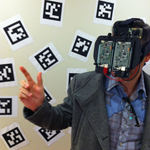Tuesday, January 23, 2018
 Tuesday’s conference activities take place between 10:00 am and 6:30 pm at the Borough of Manhattan Community College’s Fiterman Hall, 245 Greenwich Street, 6th and 14th floors, New York, New York 10009
Tuesday’s conference activities take place between 10:00 am and 6:30 pm at the Borough of Manhattan Community College’s Fiterman Hall, 245 Greenwich Street, 6th and 14th floors, New York, New York 10009
This second day of the conference is more informal. Most of the day we will be playing board and card games (both educational and entertainment) together in a social, bonding atmosphere. We welcome you to bring your own educational games for play testing and feedback.
We will also feature two concurrent game design workshops for students, faculty, and staff:
Track 1: Allure of Play Game Design Workshop, Hosted by Joe Bisz and Victoria Mondelli
Track 2: Introduction to Game Design and Programming in the Unity Game Engine, Hosted by Robert Duncan and Deborah Sturm (***THIS TRACK IS COMPLETELY FULL. PLEASE REGISTER FOR TRACK 1***)
Please sign up to attend the workshops.
SCHEDULE OVERVIEW
10 am – 6:30 pm (Fiterman F601) – Free gameplay and play testing all day long!!
10 am – 1 pm and 2 – 5pm (Fiterman F613) – Game Design and Programming in Unity (participants should plan to attend both parts)
11 am – 12 pm (Fiterman F612) – What’s Your Game Plan? Turn your lesson or training into a game! What does the lesson “Finding Citations,” the game “Trivial Pursuit,” and the mechanic “Bluffing” all have in common? In this bootcamp brainstorm, attendees are broken up into design teams whose job is to enhance an instructional plan with the mechanics of popular board games in only 20 minutes.
12 – 1 pm (Presentation in Fiterman 1404/05/06) and 2 – 5 pm (workshop in Fiterman F612) – The Allure of Play in the Classroom (workshop participants should plan to attend both parts)
1– 2 pm – Lunch
Allure of Play Game Design Workshop What if you could be given a method for designing learning activities around lessons you already use? Are you interested in making your lessons and activities more innovative and playful? Joe Bisz will discuss the principles behind game-based learning, then explain his “Complex Mechanics” method for designing rigorous classroom games. Then, Joe and Tori Mondelli will show you how to incorporate game mechanics and learning principles into your exercises, as you work together with fellow faculty to build a non-digital game for your classroom. This workshop is born from methods researched in their upcoming book for faculty. (You can stay for just the presentation and not the workshop.)
Introduction to Game Design and Programming in the Unity Game Engine Digital games offer unique affordances for learning. Robert Duncan and Deborah Sturm have taught hundreds of undergraduates how to build games in the Unity game engine, and they will guide you through the process. Attendees will learn many skills related to digital game development for education including (1) how digital games can be used to shape behaviors in a target population; (2) how iterative design can be used to build effective software; (3) how to use a commercial game engine; (4) the basics of the C# programming language; (5) game asset creation; and (6) the principles of object oriented programming.
Featured Presenters
Joe Bisz is a part-time educational games designer and an Associate Professor of English at CUNY Borough of Manhattan Community College. Not so long ago, he received a Ph.D. in Creative Writing and English Literature from Binghamton University. Since then he has sailed his theoretical ship into a few ports of the world, including gender & sexuality studies, Popular Culture & Sci-fi, and games-based learning. His critical work has been published in Reconstruction: Studies in Contemporary Culture, Transformative Works and Cultures, and his creative writing in a dozen journals and anthologies including Diagram. His free time is mostly taken up revising a novel titled World Without End, set in New York City in 1982, and developing a game-based learning management system (LMS) called College Quest. “In teaching, we would call it scaffolding. In game-based learning, we would call it a game.” (See Joe’s website at http://joebisz.com)
is a part-time educational games designer and an Associate Professor of English at CUNY Borough of Manhattan Community College. Not so long ago, he received a Ph.D. in Creative Writing and English Literature from Binghamton University. Since then he has sailed his theoretical ship into a few ports of the world, including gender & sexuality studies, Popular Culture & Sci-fi, and games-based learning. His critical work has been published in Reconstruction: Studies in Contemporary Culture, Transformative Works and Cultures, and his creative writing in a dozen journals and anthologies including Diagram. His free time is mostly taken up revising a novel titled World Without End, set in New York City in 1982, and developing a game-based learning management system (LMS) called College Quest. “In teaching, we would call it scaffolding. In game-based learning, we would call it a game.” (See Joe’s website at http://joebisz.com)
 Dr. Victoria Mondelli, a native of New York City, joined Mercy College in 2012. She directs faculty development for teaching and learning across our campuses. Under her direction, OTEEL raises awareness for best practices across the curriculum and in the disciplines. Tori and the OTEEL team assist faculty in the adoption of sound pedagogical principles and practices. They offer individual consultations, discipline-specific teaching circles, and co-host faculty learning communities with faculty partners. Additionally, via the Faculty Center for Teaching and Learning, Tori raises awareness for the value of the Scholarship of Teaching and Learning, educational innovation with technology, Open Educational Resources (OER), and classroom techniques to check the students’ “pulse” on learning. With an active research agenda in teaching and learning, as well as in history, Tori publishes and presents on SoTL topics, the history of education, and women’s history. She also enjoys being a guest facilitator for learning alongside faculty colleagues at Mercy and CUNY. Currently, she is participating in EDUCAUSE’s Breakthrough Models Academy to find collaborative opportunities and solutions to the most pressing issues in Higher Education, today.
Dr. Victoria Mondelli, a native of New York City, joined Mercy College in 2012. She directs faculty development for teaching and learning across our campuses. Under her direction, OTEEL raises awareness for best practices across the curriculum and in the disciplines. Tori and the OTEEL team assist faculty in the adoption of sound pedagogical principles and practices. They offer individual consultations, discipline-specific teaching circles, and co-host faculty learning communities with faculty partners. Additionally, via the Faculty Center for Teaching and Learning, Tori raises awareness for the value of the Scholarship of Teaching and Learning, educational innovation with technology, Open Educational Resources (OER), and classroom techniques to check the students’ “pulse” on learning. With an active research agenda in teaching and learning, as well as in history, Tori publishes and presents on SoTL topics, the history of education, and women’s history. She also enjoys being a guest facilitator for learning alongside faculty colleagues at Mercy and CUNY. Currently, she is participating in EDUCAUSE’s Breakthrough Models Academy to find collaborative opportunities and solutions to the most pressing issues in Higher Education, today.
 Robert O. Duncan is an Associate Professor of Behavioral Sciences at York College, with joint appointments in Biology (Neuroscience subdivision) and Psychology (Cognitive Neuroscience subdivision) at the CUNY Graduate Center. Dr. Duncan’s primary research interests are (1) to study the physiological mechanisms of visually guided behavior in healthy individuals and (2) to develop novel functional magnetic resonance imaging (fMRI) techniques to quantify neuronal, vascular, and metabolic contributions to neurodegenerative visual disorders. Dr. Duncan also studies the intersection of game-based learning and undergraduate research. Games are excellent learning management systems that are capable of both teaching and assessment. He teaches students how to develop games and digital technology to inform, teach, and shape behavior. These games strive to incorporate everything we know about psychology, neuroscience, education, and game design into the learning experience. You can find him at http://transformativegames.org
Robert O. Duncan is an Associate Professor of Behavioral Sciences at York College, with joint appointments in Biology (Neuroscience subdivision) and Psychology (Cognitive Neuroscience subdivision) at the CUNY Graduate Center. Dr. Duncan’s primary research interests are (1) to study the physiological mechanisms of visually guided behavior in healthy individuals and (2) to develop novel functional magnetic resonance imaging (fMRI) techniques to quantify neuronal, vascular, and metabolic contributions to neurodegenerative visual disorders. Dr. Duncan also studies the intersection of game-based learning and undergraduate research. Games are excellent learning management systems that are capable of both teaching and assessment. He teaches students how to develop games and digital technology to inform, teach, and shape behavior. These games strive to incorporate everything we know about psychology, neuroscience, education, and game design into the learning experience. You can find him at http://transformativegames.org
 Deborah Sturm is an Associate Professor of Computer Science at the College of Staten Island, where she teaches undergraduate and graduate courses. She designed and teaches two gaming electives and introduced an area concentration in game development. Dr. Sturm is the faculty coordinator for the Faculty Interest Group in Gaming and Pedagogy under the auspices of the Faculty Center for Professional Development. She was the Co-PI and a Project Director on a NSF-STEM grant, “Science and Technology Expansion via Applied Mathematics (STEAM),” an NSF-funded program to expand undergraduate STEM education. Through this and other grants, she collaborates with members of the Psychology Department to design and develop research apps for children on the Autism spectrum.
Deborah Sturm is an Associate Professor of Computer Science at the College of Staten Island, where she teaches undergraduate and graduate courses. She designed and teaches two gaming electives and introduced an area concentration in game development. Dr. Sturm is the faculty coordinator for the Faculty Interest Group in Gaming and Pedagogy under the auspices of the Faculty Center for Professional Development. She was the Co-PI and a Project Director on a NSF-STEM grant, “Science and Technology Expansion via Applied Mathematics (STEAM),” an NSF-funded program to expand undergraduate STEM education. Through this and other grants, she collaborates with members of the Psychology Department to design and develop research apps for children on the Autism spectrum.


